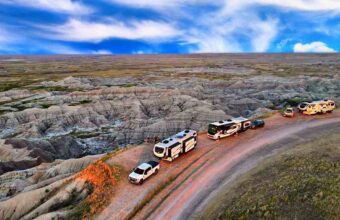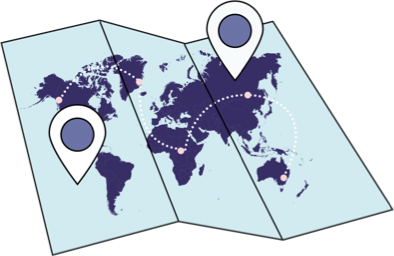Renting An RV For An Epic Road Trip
An essential guide to renting and planning an epic RV road trip
The joy of an RV national park road trip is its simplicity: your family, the open road and the great outdoors. But a successful RV trip isn’t quite as easy as renting a rig and hitting the road.
Keeping your RV adventure epic (and not an epic failure) takes some advance planning and preparation, especially if you plan to include some of America’s national parks on your trip. Not only do you need to plan your route with drive times and refuelling stops but you’ll need to book overnight stops well in advance—unless, of course, you’re happy camping out in a Walmart parking lot!
Here's our essential guide on how to rent an RV for an epic road trip.
How to rent an RV for a road trip
Things to know before you rent your RV
You don’t need to purchase your own RV to make your epic road trip dreams a reality. It’s easy to find an RV rental near you that is perfect for your family.
Rental chain vs from owner
Larger cities across the country may have a national RV rental chain. Cruise America, El Monte, Road Bear, and USA RV Rentals all have locations spread across the US. RVs from national chains tend to be basic units without a lot of options, like bunk beds and outdoor kitchens. Bedding, cook ware, and utensils need to be supplied by the renter or added to your rental at an additional cost.
The ‘sharing economy’ has been terrific for people who want to try RVing or are thinking about buying an RV but want to test a few different types. RV rental by owner companies like RVshare and Outdoorsy help RV owners rent their personal campers and motorhomes – kind of like AirBnB for RVs.
These RVs are usually upgraded models with additional options like slides (for more room), bunk beds, outdoor kitchens, and easy access hook-ups. When renting a personal RV more amenities are included in the cost. Renters usually have access to kitchen and grilling supplies, plates and utensils, bedding for at least one bed, a camp rug, and camp chairs.
The only downside to RV rental by owner is that most people only have a single RV. If the RV is damaged by a previous renter there may not be a replacement unit available. Both RVshare and Outdoorsy will do their best to help you find a suitable unit from another owner, but it won’t be exactly what you had initially requested.
When renting an RV there are a few things you need to be sure are in order before you can drive away:
- All licensed drivers will need to provide copies of their current drivers license.
- All contracts, payments, and the security deposit must be completed.
- Liability insurance must be purchased in case of accident or injury.
What size RV should I rent for a family road trip?
When choosing an RV rental you want to be sure to have enough space for your family, but you also need to be realistic about what size RV you will be comfortable driving.
Another thing to check is if the RV has enough seat belts for everyone traveling. Most bench seats and couches are equipped with seatbelts.
When you begin researching RV rentals you will find three classes of motorhome, as well as towable camping trailers:
- Class A motorhomes are built on a custom chassis and resemble a bus. Length ranges from 21-40 feet. Most Class A motorhomes have a bed over the front seats, as well as a dinette or couch bed. This unit type can sleep 6-8 people, on average, but may only have 6-7 seatbelts.
- Class B motorhomes are built on a minibus or panel-truck shell. These units are smaller and very mobile; perfect for couples. Length can be from 16-22 feet.
- Class C motorhomes are built on a van frame with a wider body section attached behind the front cab. These are most recognisable by the front over-cab sleeping area. Length ranges from 21-35 feet. Most Class C motorhomes can sleep 6-8 people comfortably between the over-cab bed, drop-down dinette, couch, or bunk beds, though the unit may only have 6-7 seatbelts.
- Camping trailers vary in length and weight, usually from 16-24 feet. When considering a camping trailer you need to be sure your vehicle has the capacity to tow the weight of the RV as well as anything inside it. For safety reasons passengers are not allowed to ride in a towed RV.
If you want to be sure an RV is the right fit for your family, ask to see the unit before renting. You can also ask about a test drive, to be sure you are comfortable handling the vehicle.
Can I rent an RV for a one-way trip?
One-way RV vacations, usually crossing the US from coast to coast, are incredibly popular. National RV rental companies like Cruise America, El Monte, Road Bear, and USA RV Rentals all offer one-way rentals. As you’d expect, it’s not usually possible to do a one-way trip when renting from a private owner.
RV camping in US national parks
Essential tips for visiting National Parks with your RV
Most of the United States' national parks are found in remote areas and often cover hundreds, or even thousands, of acres of land. These destinations are perfect for an epic RV road trip!
When including a national park in your RV vacation, forward planning is key. For the most popular parks you should begin planning at least nine months in advance. This gives you enough time to find the right RV, plan out your route and campgrounds, and reserve your spot before they book up (see below).
Can you RV camp in national parks?
RV camping is welcome in the national parks that can accommodate them. Not all national parks are accessible by road, while other parks may have short tunnels, narrow roads, or bridge weight limits that restrict RV access. Some national park campgrounds simply don’t have the space to accommodate large rigs.
Do national parks have RV size limits?
Some national parks do have RV size restrictions due to limited space, narrow or obstructed roads, and campground vegetation. Always check the official website of the park you are visiting for specific camping information.
To do this access www.nps.gov, click ‘plan your visit’, then ‘eating & sleeping’ learn more. Keep in mind that each campground within a park will have different restrictions.
Are RV hookups available in national parks?
Most national park campgrounds are ‘standard non-electric’. This means that there are no RV hookups. You will need to fill your RV water tank before parking in your site and if you require electricity you will need to run a generator.
Research your campground thoroughly before booking. Some parks will have a water filling station for your RV’s fresh water tank, and some campgrounds may have a dump station for the black and grey waste tanks. Other campgrounds may not offer any amenities, and most have ‘quiet hours’ when a generator can not be run.
How do I book a national park RV campsite?
National park campsites and RV campgrounds can be reserved on a 6-month rolling basis, meaning the earliest date you can book your campsite is 6 months from the current date. Campsites at popular campgrounds book up quickly so plan to make your online reservation on the date it becomes available promptly at 8am EST.
To make your national park campground reservation visit www.recreation.gov, choose your national park, then choose the campground you wish to reserve. Be sure to do your research in advance so you know exactly which campground and campsite you need. Wasting time deciding while you are making your booking can result in missing the reservation.
Most campgrounds also have non-reservable, or first-come first-served, sites. To obtain one of these sites you need to arrive at the park early and queue, usually at the ranger station, for open spots. There are no guarantees of receiving a non-reservable spots and during high season these fill quickly (often before 8am!) so if you want one you must be near the front of the queue.
Are there private campgrounds near national parks?
If you prefer to plan your vacations earlier, need more amenities, or your RV won’t fit into the national park you intend to visit, you can opt for a private campground instead.
Bookings at privately owned campgrounds can usually be made a year or more in advance, campsites can often accommodate larger rigs, water & electricity hookups are routinely provided, as are other luxuries such as pools, showers, and a camp store.
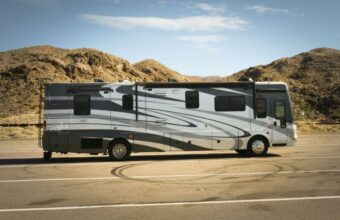
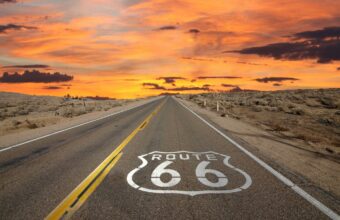
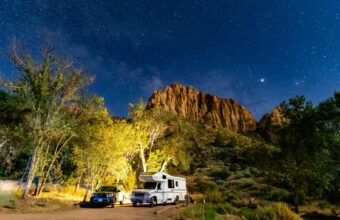
Planning a national park RV trip
When to start planning an RV road trip
If your RV trip includes a national park begin planning at least nine months in advance. This gives you plenty of time to research RV rentals, ensure the park campgrounds can accommodate your rig, and have enough time to book a spot in the campground(s).
If you’re calling at other popular destinations you probably need to begin even earlier: many popular resort area campgrounds can fill a year in advance during holidays and the summer season.
How long should our RV road trip be?
As you plan the length of your RV road trip keep in mind that RVs don’t travel as quickly as cars. A good rule of thumb is to add approximately 15 minutes to every hour the drive would take in a car; an eight hour drive in a car would take approximately 10 hours in an RV.
To plan your trip duration begin with how long you want to be at your destination. Then determine how much time you will be driving. Don’t plan to drive more than 8-10 hours per day unless you absolutely must. And be sure to build in a break every few hours to avoid driver fatigue.
How much does an RV road trip cost?
The short answer is: it depends. A typical four-person family on a two-week rental RV road trip calling at three or four national parks might spend between $3,500 and $7,500 all-in.
This breaks down as follows:
RV rental costs: This varies significantly by rental company, and by size and type of rig, but broadly speaking you can expect to pay between $250-$400 per day for a Class A motorhome and between $175-$300 for a Class B or C vehicle.
Gas (petrol) costs: Mileage varies by class: Class A RVs range between 5-14 miles per gallon (mpg), the most streamlined Class Bs can reach 25 mpg, for Class Cs it’s between 14-23 mpg. Trip costs depend entirely on the distances you plan to cover, but a typical 1,200 mile trip might cost between $200-$450 in gas.
Food: Again, this depends on your trip duration and preferences. Eating out will push up your food costs but if you’re exclusively self-catering and using supermarkets and local stores, a family of four might spend between $20 and $45 per day on food.
Entrance & camping fees: Finally don’t forget entrance and camping fees at national and state parks. These also vary considerably, but national parks generally charge between $15-$30 per day for RV camp spots, in addition to entrance fees, which can cost between $20-$35 per private vehicle for a week-long pass.
In addition there are some other costs to factor into your overall trip budget:
- Liability insurance: $20-$40 per day, depending on the unit.
- Security deposit: $500-$1,500; refunded on return of the unit.
- Bedding: $50-$60 per kit
- Kitchenware: $90-$110 per kit
- RV rentals by private owner may also provide optional items at additional cost, such as a grill, bike rack, camp chairs, XM radio, etc.
Where can you park on an RV road trip?
Campgrounds are not your only option as you drive to your destination.
The beauty of RV travel is having your bed with you, allowing you to settle in for a night nearly anywhere.
Large parking lots at RV friendly stores like Walmart, Costco, and Cracker Barrel are easy places to stop for a night. Always check with the store manager to be sure overnight parking is allowed. Truck stops and rest areas also provide well-lit parking for a few hours. When boondocking at an unsecured location you are doing so at your own risk; be sure to use caution.
For an ‘off the grid’ and more interesting experience consider Harvest Hosts (www.harvesthosts.com), a program that offers free RV camping at privately owned farms, wineries, and attractions across the US. There is a cost to join this program, but it can pay for itself in just two overnight stays.
How will I get around?
Getting around once you reach your destination is one of the most overlooked aspects of an RV road trip.
Some RV owners tow a vehicle with them as unhooking the RV daily, getting everything put away and secured, then hooking up again every night is a hassle, especially if you are camping in the same place for a few days.
Another consideration, especially in national parks, is that large RVs just won’t go every place you may wish to visit. Narrow, winding roads, small tunnels, and crowded parking lots are just not made for such large vehicles.
Most RV rentals do not allow towing so you will want to plan for this in advance. Decide if you will use a form of public transportation or rent a vehicle at your destination. Another option is to add a bicycle rack to the RV (many owners will rent these) and take your bikes.
What to pack for an RV trip
The best thing about traveling in an RV is the amount of storage and no checked bags or suitcase weight limits!
Beyond the obvious basics like food, clothing, and destination specific items, there are a few extra things to make your RV trip comfortable:
- Bedding, pillows, and towels. Sleeping bags are ideal for RVs with bunk beds or drop-down dinette beds. (This may be included with private RV rentals or can be added at an additional cost.)
- Cookware and aluminum foil for cooking over a campfire. Don’t forget a fire starter!
- Coffee pot, tea kettle, or something to boil water in.
- Kitchenware, paper towels, and trash bags. (Some of these items may be included with private RV rentals or can be added at an additional cost.)
- Camp chairs (may be included with private RV rentals or added at an additional cost).
- Portable clothesline or drying rack.
- First aid kit.
- Headlamp or flashlight.
- A small rug for outside the door (if not provided).
Meal planning for an RV road trip
While it’s tempting to stick to easy-to-grill food like hamburgers and hot dogs for your RV vacation, it can get pretty boring after a few days. Most RVs have a microwave or oven, so consider meals that can be frozen in advance to be reheated during your trip. Because you will have electricity you can also bring along a slow cooker or other countertop kitchen appliance (just be sure these are safely stowed when the RV is moving!)
Most RVs have a refrigerator with enough space for a couple days of food, so don’t forget easy to make meal items like sandwiches, breakfast cereals, fruits, and vegetables.
Plastic wrap or reusable storage containers are recommended to keep any leftovers fresh for another meal.
What is the best RV trip planner?
An online map is a great first step to plan your RV route. If you want to add interesting stops along the way plug your starting point and destination into the Roadtrippers (www.roadtrippers.com) trip planner. Always double check your route using an RV trip planner like CoPilot RV Navigation (www.copilotgps.com/en-us/rv-navigation) or a truck driver’s app to be sure roads are suitable for your vehicle.
Always bring a road atlas or map along on an RV trip as cellular service can be spotty in remote areas.
Handy apps for an RV road trip
Use these apps as you plan your trip.
- Camping Recipe App – available on Google Play. A large variety of camping recipes that can be prepared over a fire, on a camp stove, or wrapped in foil packets.
- Roadtrippers – available in the App Store or Google Play. Find quirky roadside attractions and fun stops along your route.
- CoPilot RV Navigation - available in the App Store or Google Play. Calculates your route based on vehicle size. Does not require cellular service.
- iExit - available in the App Store or Google Play. Lets you know what services are available at upcoming exits.
- GasBuddy - available in the App Store or Google Play. Find gas stations and the best prices.
- RV Parks & Campgrounds - available in the App Store or Google Play. Search over 40,000 RV parks and campgrounds in North America.
- First Aid - available in the App Store or Google Play. An app from the American Red Cross providing basic first aid information.
- Accuweather - available in the App Store or Google Play. Keep an eye on the weather for your drive and your camping experience.
- Startracker - available in the App Store or Google Play. Identify the stars, planets, and constellations.
Things to ask before setting off on your RV road trip
Don’t leave on your RV road trip without knowing the answers to these questions. A quality RV rental company or good private RV owner should answer all these questions for you with no hesitation:
- When was the RV last serviced and when is it due for the next service? If your rental will be long or cover a lot of miles this is very important!
- When were the tires checked and when were they last replaced?
- What is the tire pressure? And is there a tire gauge to check with before driving?
- Does this RV need special fuel? Some RVs are diesel, and some gas RVs do not like high ethanol.
- Does this rental include roadside assistance? If this is not provided, see if you can get it through your own insurance or roadside assistance coverage.
- How tall/ wide/ long is this RV? You need these dimensions for some roads and campgrounds. Some RV campgrounds can't accommodate large RVs.
- Where is the proof of insurance? You will need this if you get pulled over or have an accident.
- Where is the owner's manual? Very helpful if you need a quick reminder of how things work.
- Who do I call in case of an accident or emergency? Large rental companies will have a toll-free number, but when working with private owners you need the best number for any time of day.
- What do I need to do to get my security deposit back? Most RVs must be thoroughly cleaned, and waste tanks dumped to receive a full return of deposit.


